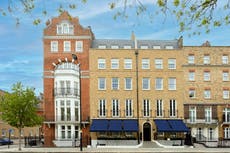Your support helps us to tell the story
From reproductive rights to climate change to Big Tech, The Independent is on the ground when the story is developing. Whether it's investigating the financials of Elon Musk's pro-Trump PAC or producing our latest documentary, 'The A Word', which shines a light on the American women fighting for reproductive rights, we know how important it is to parse out the facts from the messaging.
At such a critical moment in US history, we need reporters on the ground. Your donation allows us to keep sending journalists to speak to both sides of the story.
The Independent is trusted by Americans across the entire political spectrum. And unlike many other quality news outlets, we choose not to lock Americans out of our reporting and analysis with paywalls. We believe quality journalism should be available to everyone, paid for by those who can afford it.
Your support makes all the difference.France will move to the UK’s amber travel list from 4am on Sunday 8 August, getting rid of its contentious “amber plus” status.
The government announced several changes to the rules for international travel on Wednesday night, with some destinations being moved into the green list and others into the red.
All travellers returning from countries on the amber list must show proof of a negative Covid test before departure to the UK and must self-isolate at home for 10 days, unless they are under 18 or have been double vaccinated in the UK, EU or the US.
Here is everything you need to know about travelling to and from France:
Going to France
France has its own traffic light system for international travel, similar to the UK’s. England is currently on the French amber list, and entry requirements are different for vaccinated and unvaccinated travellers.
Visitors from countries on the French amber list who are unvaccinated or not fully vaccinated will only be permitted to travel for essential reasons.
Aside from French citizens or EU citizens returning to or transiting through France with their families, “compelling reasons” to travel to France include for work if you are a British civil servant, border police officer, custom officer, and Channel Tunnel staff.
Foreign health or research professionals “involved in the fight against Covid-19” and their families are also included in the country’s list of essential reasons.
You can also travel to France from amber list countries for family reunions, if you have a “talent passport”, and if you are a student enrolling in a French university.
You will need to print and carry a travel certificate to enter France, as well as a “sworn statement” that certifies your vaccination status.
Unvaccinated travellers over the age of 12 from the UK must show proof of a negative PCR test or negative antigen test taken less than 24 hours prior to departure. You will also need to present a “sworn statement” to take a Covid test on arrival in France, and self-isolate for seven days. You will also have to take another PCR test at the end of the isolation period.
Vaccinated travellers do not have to isolate in France or present a negative Covid test, but will still have to show a “sworn statement” that shows you do not have any Covid-19 symptoms or had any contact with a positive Covid-19 case.
Returning from France
UK citizens who are unvaccinated or not fully vaccinated wishing to return from France to the UK must first complete a Certificate to leave Metropolitan France, which specifies exemptions for travel. Vaccinated travellers are not required to present an essential reason for travel.
All travellers, including UK nationals, must show proof of a negative Covid test taken up to three days before departure to the UK. Advice from the Department for Transport warns that your airline or carrier may refuse you boarding if you do not provide proof of a negative test, or you may be fined on arrival.
When France moves into the amber list on Sunday 8 August, fully vaccinated arrivals and people under the age of 18 will not have to quarantine or take a test on the eighth day after returning.
However, you must have had your final dose of a Covid vaccine at least 14 days before arriving back in England, and will still have to book and take a PCR test two days after returning.
Unvaccinated travellers will have to quarantine for 10 days upon arrival and take a Covid-19 test on the second and eighth day of isolation.
Are there any exemptions?
There are a limited number of international travel exemptions reserved for people in specific jobs or who have medical requirements.
These include aircraft pilots and crew, aerospace engineers, border security staff, BBC staff, bus and coach drivers, business directors, Channel Tunnel workers, civil aviation inspectors, and more. The full list of jobs that are exempt from travel restrictions is available here.
People travelling for compassionate reasons also qualify for a travel exemption, “where it is not possible to accommodate a visit to a severely ill or dying relative or member of your household from within managed quarantine”.




Join our commenting forum
Join thought-provoking conversations, follow other Independent readers and see their replies
Comments